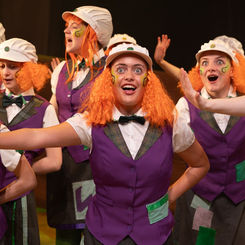A Thousand Splendid Suns - Harrowing, heart-breaking and unmissable.
- ann-evans

- Apr 17
- 4 min read

A Thousand Splendid Suns, by Ursula Rani Sarma. Based on the book by Khaled Hosseini. Directed by Roxana Silbert. At The Birmingham Rep running from 11 April to 3 May 2025.
Review by Ann Evans.
A Thousand Splendid Suns is the most beautiful title for a book and a play; the performances by the cast of this production are superb; the intention of the director to give a voice to the unheard and overshadowed is most certainly achieved; and the story is probably the most harrowing and heart-breaking that this reviewer has ever seen on stage.
A Thousand Splendid Suns tells the story of two families living in Kabul, Afghanistan, between 1974 to 2001. It opens with 15-year-old Laila and her parents hurriedly packing to escape the war. Her father is a gentle poetry-reading person, and those particular words – A thousand splendid suns are amongst the last words spoken – read from a book of poetry before a shell explodes on their home and the parents are killed.

Laila is dug from the rubble and nursed back to health by neighbours Rasheed and his wife Miriam – a childless couple, although we later learn that Miriam has suffered five or six miscarriages. Rasheed wants to take Laila as his second wife, which their culture allows, and once she has been tricked into believing her young sweetheart Tariq has been killed in the fighting, Laila thinks being married to Rasheed is her best option.
To begin with Miriam is resentful but once Rasheed shows his true colours as a violent, monstrous bully, and Laila does her best to stop him from beating his wife, a bond is struck between the two women. This bond quickly grows into a mutual relationship of love and compassion for each other, especially when faced with Rasheed’s fury against his two wives and Laila’s new-born baby girl. For Miriam, Laila and baby Aziza are the family that she has always yearned for.

The story progresses – the play covers a time span of more than 25 years. Flashback scenes reveal Miriam’s tragic life as a girl – with both delightful and shocking images of her experiences. We also have flashbacks of Laila and Tariq – and their sweet almost innocent relationship of being childhood sweethearts – although it resulted in Laila carrying Tariq’s baby. Something Rasheed must never find out about.
The experiences of these women, which are representative of countless women in such countries, gives us glimpses of the many hardships they endure, not least childbirth in the very worst of circumstances. When Laila gives birth, it’s a caesarean without oxygen or anaesthetic. Both she and her daughter Aziza (Humera Syed) survive and we see as the story quickly moves forward, that Laila also has a boy, fathered by Rasheed, who they name Zalmai (Noah Manzoor).

We next see the children aged around nine or ten – fun loving with dreams of a happy future. And there are thankfully a few lighter moments which make this existence bearable. However, we see that Rasheed favours his son far and above his daughter, and it’s clear that he intends the boy to grow up with the same attitude and behaviour towards women as he has.

Aziza, like her mother, wants to learn, and they arrange to send her to a secret school some distance away. Laila misses her so much, she risks travelling alone to see her. Women however, are not permitted to be out alone without a male chaperone, and she endures the lashings and beating by the Taliban for breaking these rules.

As the brutal regime becomes more oppressive, so Rasheed's anger and hatred for his wives grows worse. For actor Jonas Khan playing this brutal husband, it must have been a very difficult role to take on, and although every member of that audience must have despised him and his actions, he played the part brilliantly and unapologetically. Likewise Miriam and Laila – brilliant acting in a subtle, modest unassuming manner that made these characters so believable, and so our hearts went out to them as they endured everything life threw at them.

The set for the acting out of this heart wrenching story feels very authentic – lighting, music, simple props, a few dramatic pieces of scenery, but otherwise traditional carpets on the floor, a few raised platforms, a background representing the mountains of Afghanistan, and we were transported to a house, on the street, at a train station, anywhere. The skills of the set and costume designer Simon Kenny and the team of lighting and sound technicians allows us to experience a symbolic setting rather than one that’s intended to be lifelike.

Under the direction of Roxana Silbert and the creative team, plus of course the initial story written by Khaled Hosseini, and the adaptation by Ursula Rani Sarma, we are taken into the heart of a war-torn country with its harsh and oppressive regimes, where people – especially the women have suffered greatly for generations. The terrifying thing of course, is that it all still goes on.
A post show discussion will take place with Abdul Wase Samin on Thursday 17 April following the 7.30pm performance.
For tickets please go to: https://www.birmingham-rep.co.uk/whats-on/a-thousand-splendid-suns























Comments